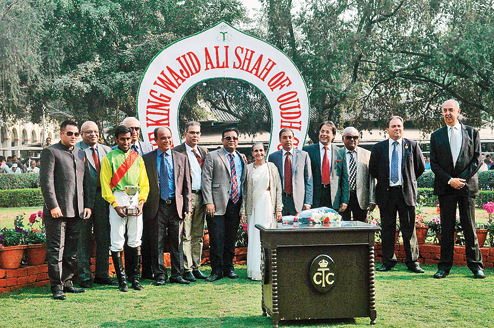
Descendants of Wajid Ali Shah, the last king of Awadh, presented the cup in his name at the Royal Calcutta Turf Club on Friday afternoon. Picture by Bishwarup Dutta
When the descendants of the last king of Awadh (the Brits called it Oudh), Wajid Ali Shah (1822-1887), who is all but forgotten today, decide to present a horse racing cup in his name to revive his memory it can be read as one of the ironies of history.
Historians agree that this complex, extraordinary and talented man, who was more of a poet than a ruler, was treated with utmost shabbiness by the British rulers.
The Royal Calcutta Turf Club's (RCTC) magnificent stands on the Maidan and the racing events held there still doff their hat to Raj traditions just as many of the stuffier clubs do. Even in these days when jeans have become the standard uniform of all Indians cutting across gender and class, male members of RCTC are required to wear a jacket and tie.
The King Wajid Ali Shah of Oudh Cup was presented on a bright and sunny Friday afternoon with flowers smiling all around the stands. The main event of the day was the Indian Champions Cup. The city horizon as seen from the stands is still dominated by the Victoria Memorial Hall, although several highrise buildings have butted their way in. The king adored the British empress, although their characters could not have been more different.

The king himself in all his finery in Lucknow
Nestled amidst the greenery somewhere across Red Road is Fort William where the king was imprisoned after he was exiled to Calcutta in 1857. He recreated a 'Second Lucknow' in Matiabruz after he was released. But it did not take long for Wajid Ali Shah's name to sink into oblivion soon after his death in Calcutta, when the palaces and the zoo he had built were razed to the ground by the British. Only Sibtainabad Imambara and his private mosque were spared.
The king's arrival in this city had created quite a sensation as recorded both by Hutom of Naksha fame and H.E.A. Cotton. Harmless though he was, he was imprisoned during the First Uprising for the rulers feared his presence may incite his sympathisers, of which there were many.
Wajid Ali Shah's popularity as a ruler, whose kingdom was annexed in 1856 by the British, can be gauged from two incidents recorded by historian Jadunath Sarkar and quoted by Kamal Sarkar in his book Kolkatar Statue.
James Outram, known for his bravery and chicanery, was appointed resident at Lucknow in 1854 and he was instrumental in facilitating the annexation of Awadh. During his lifetime, his powerful equestrian statue was installed both in Calcutta at the Park Street-Chowringhee intersection and London. It is now in the Victoria Memorial Hall.
The historian's relative had noticed a Bengali gentleman bribing two Muslim urchins to throw shoes at the statue. As the missiles struck the bronze figure the gentleman would jump for joy.
The second story is about an old Shiite man who climbed up on Outram's horse and struck him repeatedly with his shoe shouting all the while: 'You have snatched our Awadh from Wajid Ali Shah.' This happened when Sir Jadunath was still going to school in the late 19th century.
The king was forgotten but the light classical music genre, thumri, which he was said to have introduced during his stay in Calcutta, continued to be popular, and what we call Mughlai cuisine, with biryani ruling the roost, which he brought with him when he left Lucknow along with poets, dancers, musicians and chefs, refuses to relinquish its hold over our taste buds.
Satyajit Ray brought Wajid Ali Shah back to vivid life in his film, Shatranj ke Khiladi, in 1977. The Calcutta Municipal Corporation has named the main road in Matiabruz after him. And last year, historian Rosei Llewellyn Jones released the book, The Last King in India: Wajid Ali Shah, which contains a detailed study of his stay in Calcutta.
On Friday afternoon, Naseem Ara Begum, great granddaughter of Wajid Ali Shah, and her sons, Humayun Ali Mirza, Sikandar Ali Mirza and Shaheryaar Ali Mirza, were all present in the parade ring of the RCTC for the presentation. The Tipu Sultan cup is presented in the Bangalore races.
Humayun Ali Mirza says the descendants of both Wajid Ali Shah and Tipu Sultan are related. One of Wajid Ali Shah's sons was Prince Ibrahim Ali Mirza, who married Ahmadi Begum, great granddaughter of Tipu from his 11th son, Prince Golam Mohammad, who built the two landmark mosques at Esplanade and the intersection of Prince Anwar Shah Road and Deshapran Sashmal Road.
Ibrahim fathered three sons - Ishaq Ali Mirza, Abid Ali Mirza and Kazim Ali Mirza. The latter's son, Nazeem Ali Mirza, married Naseem Ara Begum, who presented the cup on Friday. She, on her part, was also descended from Wajid Ali Shah through one of his sons, Mirza Babar. One of the latter's sons was Prince Yusuf Miza, who was deputy mayor of Calcutta.
The Tollygunge Club and the Royal Calcutta Golf Club are built on property belonging to the Prince Golam Mohammad Trust.
It also owns the Shaw Wallace building in Dalhousie Square besides other properties on Royd Street and in the Tollygunge area. Humayun Ali Mirza is a member of the trust from the founder's family appointed by Calcutta High Court in 1999.
On Friday, Major Colours was the winner horse and his jockey was D.K. Ashish. Its owners are Syed Nadir Akhtar and Wahid Ali Khan. Humayun Ali Mirza said he is planning to institute more trophies for sport and cultural events in the near future.

